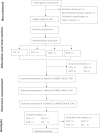The synergistic effect of acupuncture and computer-based cognitive training on post-stroke cognitive dysfunction: a study protocol for a randomized controlled trial of 2 × 2 factorial design
- PMID: 25099775
- PMCID: PMC4133058
- DOI: 10.1186/1472-6882-14-290
The synergistic effect of acupuncture and computer-based cognitive training on post-stroke cognitive dysfunction: a study protocol for a randomized controlled trial of 2 × 2 factorial design
Abstract
Background: Stroke is one of the most common causes of cognitive impairment. Up to 75% of stroke survivors may be considered to have cognitive impairment, which severely limit individual autonomy for successful reintegration into family, work and social life. The clinical efficacy of acupuncture with Baihui (DU20) and Shenting (DU24) in stroke and post-stroke cognitive impairment has been previously demonstrated. Computer-assisted cognitive training is part of conventional cognitive rehabilitation and has also shown to be effective in improvement of cognitive function of affected patients. However, the cognitive impairment after stroke is so complexity that one single treatment cannot resolve effectively. Besides, the effects of acupuncture and RehaCom cognitive training have not been systematically compared, nor has the possibility of a synergistic effect of combination of the two therapeutic modalities been evaluated. Our primary aim of this trial is to evaluate the synergistic effect of acupuncture and RehaCom cognitive training on cognitive dysfunction after stroke.
Method/design: A randomized controlled trial of 2 × 2 factorial design will be conducted in the Rehabilitation Hospital Affiliated to Fujian University of Traditional Chinese Medicine. A total of 240 patients with cognitive dysfunction after stroke who meet the eligibility criteria will be recruited and randomized into RehaCom training group, acupuncture group, a combination of both or control group in a 1:1:1:1 ratio. All patients will receive conventional treatment. The interventions will last for 12 weeks (30 min per day, Monday to Friday every week). Evaluations will be conducted by blinded assessors at baseline and again at 4, 8 and 12 weeks. Outcome measurements include mini-mental state examination (MMSE), Montreal cognitive assessments (MoCA), functional independence measure scale (FIM) and adverse events.
Discussion: The results of this trial are expected to clarify the synergistic effect of acupuncture and RehaCom cognitive training on cognitive dysfunction after stroke. Furthermore, to confirm whether combined or alone of acupuncture and RehaCom cognitive training, is more effective than conventional treatment in the management of post-stroke cognitive dysfunction.
Trial registration: Chinese Clinical Trial Registry: ChiCTR-TRC-13003704.
References
-
- Minino AM, Murphy SL, Xu J, Kochanek KD. Deaths: final data for 2008. Natl Vital Stat Rep. 2011;59(10):1–126. - PubMed
-
- Tarraga L, Boada M, Modinos G, Espinosa A, Diego S, Morera A, Guitart M, Balcells J, Lopez OL, Becker JT. A randomised pilot study to assess the efficacy of an interactive, multimedia tool of cognitive stimulation in Alzheimer’s disease. J Neurol Neurosurg Psychiatry. 2006;77(10):1116–1121. doi: 10.1136/jnnp.2005.086074. - DOI - PMC - PubMed
-
- Haring HP. Cognitive impairment after stroke. Curr Opin Neurol. 2002;15(1):79–84. - PubMed
Pre-publication history
-
- The pre-publication history for this paper can be accessed here:http://www.biomedcentral.com/1472-6882/14/290/prepub
Publication types
MeSH terms
Associated data
LinkOut - more resources
Full Text Sources
Other Literature Sources
Medical


